#washington crossing the delaware
Photo
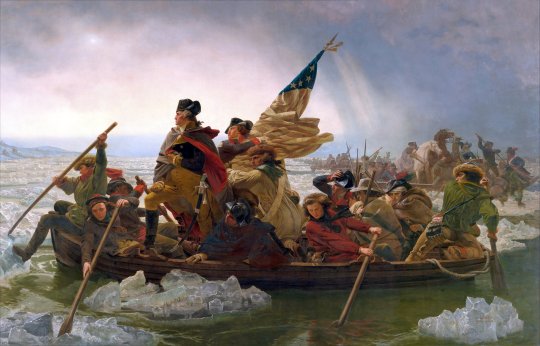
#George Washington#Washington Crossing the Delaware#painting#Revolutionary War#oil painting#Emanuel Leutze#artist#1776#history#Pennsylvania#New Jersey
306 notes
·
View notes
Text
The Feuding Presidents of Westmoreland County, Virginia

Of all the Founding Fathers, it would seem like George Washington and James Monroe would have been the closest comrades. The two men were born just miles apart from one another in Westmoreland County, Virginia. They both were large men physically, not known primarily for their intellect, but instead for their hard work, their courage, and their devotion to the Revolutionary cause. They were the two Presidents who saw the most action during the Revolutionary War and Monroe served bravely under Washington. To top it all off, Washington and Monroe kind of looked like each other, too.
On Christmas Day in 1776, Lieutenant James Monroe was one of those legendary soldiers who famously crossed the frigid Delaware River with General George Washington to engage the British at the Battle of Trenton. Monroe led a charge in that battle to help capture some cannons that were about to be fired upon the Americans and was wounded in the shoulder, a severe injury that would have resulted in him bleeding to death if it weren’t for the fortunate presence of a local doctor in New Jersey. Monroe’s heroism led to a promotion as Captain and he continued serving bravely during the war and was amongst those troops who survived the terrible winter of 1777-1778 at Valley Forge. It would seem as if none of the Presidents could have established more of a bond than the two Virginians who helped fight in the Revolution. Indeed, General Washington wrote that Monroe “has, in every instance, maintained the reputation of a brave, active, and sensible officer.”
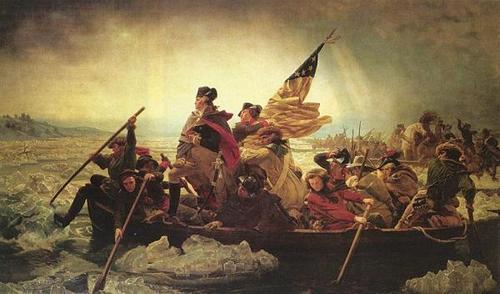
So why did they despise each other? And did James Monroe indirectly help kill George Washington?
After the Revolution, Monroe entered politics and supported the national government being formed under George Washington despite the fact that Monroe had voted against the ratification of the Constitution in 1788. As one of Virginia’s first U.S. Senators, Monroe continued his support of Washington, who was now President, but began to fear that too much power was being placed in the hands of the chief executive and found himself opposing Washington’s Proclamation of Neutrality. When Washington appointed Monroe as Minister to France in 1794, something snapped.
Monroe, like his friend and mentor Thomas Jefferson, loved France. He loved the country itself and, as an American Revolutionary, he found himself in love with the French Revolution. President Washington’s Proclamation of Neutrality insisted on American impartiality towards France and the countries that France was at war with at the time – Britain, The Netherlands, Austria, Prussia, and Sardinia. Monroe was vehemently opposed to neutrality because the French were the first and most important allies of the United States during the Revolution. Plus, James Monroe loved France. In fact, Monroe loved France so much that Secretary of State Edmund Randolph was forced to officially reprimand him due to his glowing compliments about France when Monroe presented his credentials in Paris.
From there, things continued going downhill between Washington and Monroe. Monroe rescued Thomas Paine – another one of America’s early Revolutionaries — who had been thrown into prison in France for criticizing the execution of Louis XVI. Paine was very sick and believed to be close to death, so after securing his release, Monroe arranged for Paine to stay with him at the American Ministerial residence. Paine recovered and proceeded to brutally attack George Washington verbally for allowing him to rot in prison instead of rescuing him as Monroe did. President Washington felt Monroe should have muzzled Paine, or at least repudiated Paine’s disrespectful language towards Washington.
When the United States signed Jay’s Treaty with Great Britain, easing tensions between the U.S. and it’s former colonial power, Washington expected Monroe to be a good Federalist and support the rather unpopular treaty. Monroe opposed it and refused to speak out in support of the treaty. His silence on Jay’s Treaty was the last straw for Washington. The President was furious and noting that he expected a diplomat who would “promote, not thwart, the neutral policy of the Government” recalled Monroe as Minister and ordered him to return to the United States. When Monroe learned of his recall, he said that Washington was “insane”.
Over the next few years, Monroe spent his time at home in Virginia and worked to undermine Washington and criticize the first President. Monroe questioned Washington’s capacity as a leader and felt that he had sold out the French, who had done so much to help the Americans during the Revolutionary War. Washington felt that Monroe was unqualified to critique his Presidency and that Monroe was a hopeless Francophile. In 1797, long before Monroe was considered to be Presidential timber, Washington cautioned, “If Mr. Monroe should ever fill the Chair of Government he may (and it is presumed he would be well enough disposed) let the French Minister frame his speeches”. Washington added, “There is abundant evidence of his being a mere tool in the hands of the French government.”
Monroe wasn’t ready for the “Chair of Government” on a national level, but after Washington retired to Mount Vernon and handed the Presidency over to John Adams, Monroe decided to aim for the “Chair of Government” on a state level. In 1799, Monroe campaigned to become Governor of Virginia and as Monroe’s candidacy was promoted by his friends and supporters, 67-year-old George Washington maintained his estate in Virginia in retirement and tried to do whatever he could to prevent Monroe’s rise. If Monroe was going to be Governor of Washington’s beloved Virginia, then it would practically have to happen over Washington’s dead body.
Washington wasn’t powerful enough to prevent Virginia’s state legislature from electing Monroe as Governor in December 1799, however. On a cold and snowy day, George Washington learned of his former lieutenant’s victory and took off on horseback to tend to Mount Vernon. When Washington returned to his home, cold and soaking wet, he got into an animated discussion with guests about Monroe’s victory and angrily denounced the newly elected Governor. Washington continued his discussions without removing his wet clothing. Already ill with a cold, Washington’s illness worsened. On December 14, 1799, George Washington said his last words, “Tis well” and died.
Monroe continued his public service as Governor of Virginia, a special envoy to France to secure the Louisiana Purchase for Thomas Jefferson, Minister to Great Britain, Governor of Virginia once again, and Secretary of State and Secretary of War under his close friend James Madison. In 1817, it was finally Monroe’s turn to take the “Chair of Government” as Washington had so feared. Supported by Jefferson and Madison, Monroe easily defeated Rufus King and became President, kicking off “The Era of Good Feelings” where Monroe’s popularity was almost unparalleled by any other President and the nation was unified and free of almost any partisan bickering.
In 1820, Monroe ran for re-election and was so enormously popular that no one dared to run against him. In Massachusetts, 85-year-old John Adams -- a stalwart Federalist and George Washington's Vice President -- even supported Monroe. Yet Washington got the last laugh. Running unopposed, Monroe was not only certain of victory, but it looked like he would become the only President besides Washington be elected unanimously by the Electoral College. However, Governor William Plumer of New Hampshire decided to deny Monroe that honor and reserve it for Washington and Washington only. Some stories allege that Plumer did it solely to prevent Monroe from joining Washington as unanimous Electoral College victors and some stories note that Plumer truly disliked President Monroe and voted for John Quincy Adams as a protest. Either way, the records will always show that George Washington was the only President elected unanimously and I think it's pretty clear that Washington would have appreciated that Monroe of all people was prevented from joining him in that exclusive club.
#History#Presidents#George Washington#President Washington#General Washington#James Monroe#President Monroe#Death of George Washington#Virginia#Virginia Presidents#Westmoreland County#1820 Election#American Revolution#Revolutionary War#Crossing the Delaware#Washington Crossing the Delaware#Washington's Crossing of the Delaware#Battle of Trenton#Continental Army#Military History#Presidential Rivals#Politics#Presidential Politics#Presidential Relationships#Presidential Feuds#Federalist Party#Proclamation of Neutrality#France#French Revolution#Thomas Paine
34 notes
·
View notes
Text

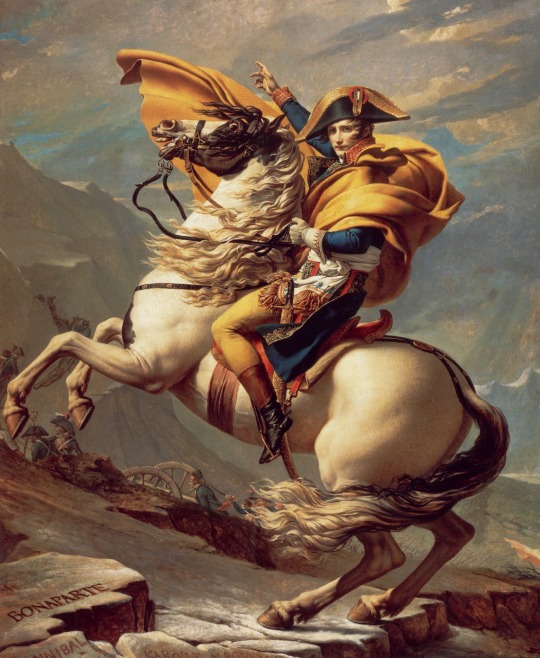

choose your fighter
#i think i'm so funny#caesar crossing the rubicon#washington crossing the delaware#napoleon crossing the alps#history#history meme#history memes#meme
4 notes
·
View notes
Text

Dear Gus & Magnus,
On our family walk this morning, Gus discovered he could ride in the stroller like Washington cross the Delaware.
Dad.
Little Rock, Arkansas. 7.2.2022 - 9.13am.
4 notes
·
View notes
Text
oh i just KNOW sherlock somehow, somewhere found a captain’s hat before he got on that boat. i know it in my heart.
#sherlock and co#sherlock & co#sherlock & co spoilers#sherlock holmes#john watson#jonk watson#johnlock#the cardboard box#the cardboard box pt 1#the cardboard box part one#the cardboard box spoilers#i know john can’t even question where tf he got it#he’s just gotta go along w it#sherlock’s got one foot up on the ledge like washington crossing the delaware#i just know he had the biggest smile on his face#your honor i love him
140 notes
·
View notes
Text

and a very merry ben tallmadge falling into the delaware river to all
#turn amc#turn washingtons spies#ben tallmadge#happy holidays#and merry christmas to the besties who celebrate!#and to those who dont happy delaware cross day!!#turn: washington's spies
59 notes
·
View notes
Text
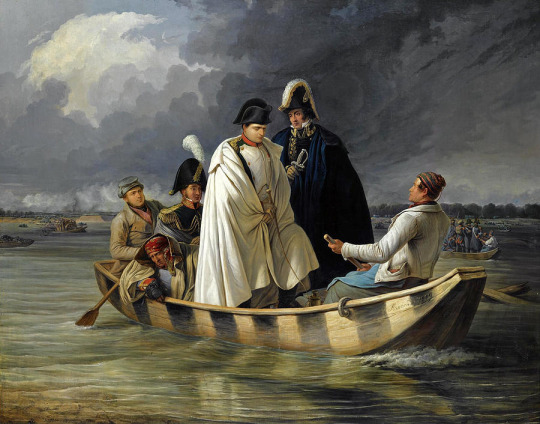
Napoleon being pretty and majestic during the War of the 5th Coalition. I like the guy behind him looking annoyed like he just got woken up from a nap.
#I’d take this over George Washington crossing the Delaware#Napoleon#Napoleon leaving the Lobau after the defeat at the Battle of Aspern#Anton Ritter von Perger#the artist was born in the same year as this event#Anton Perger#battle of aspen#aspern-essling#napoleonic era#napoleonic#France#perger#frev#Austria#french revolution#first french empire#19th century#1800s#history#napoleon bonaparte#french empire#Austrian empire#napoleonic wars#lobau#Vienna#art#painting#paintings
74 notes
·
View notes
Text
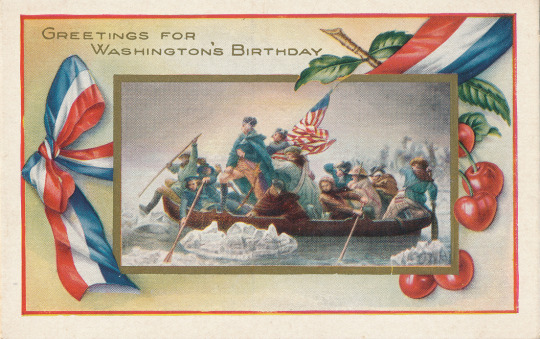
Recent Acquisition - Postcard Collection
Greetings for Washington's Birthday.
#vintage#postcard#George Washington#crossing the delaware#cherries#patriotism#Presidents Day#February#Washington's Birthday
16 notes
·
View notes
Text
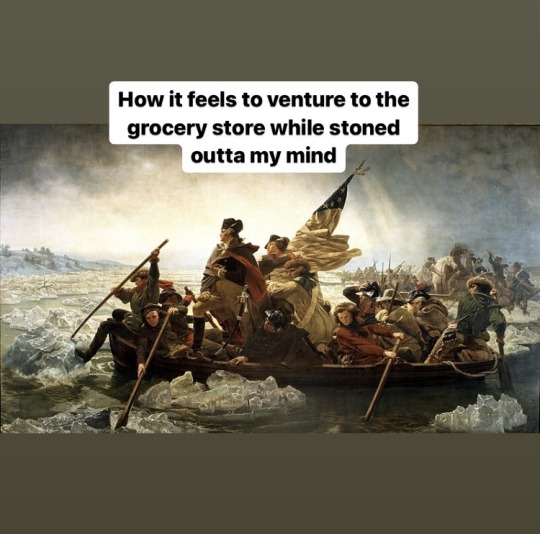
12 notes
·
View notes
Text
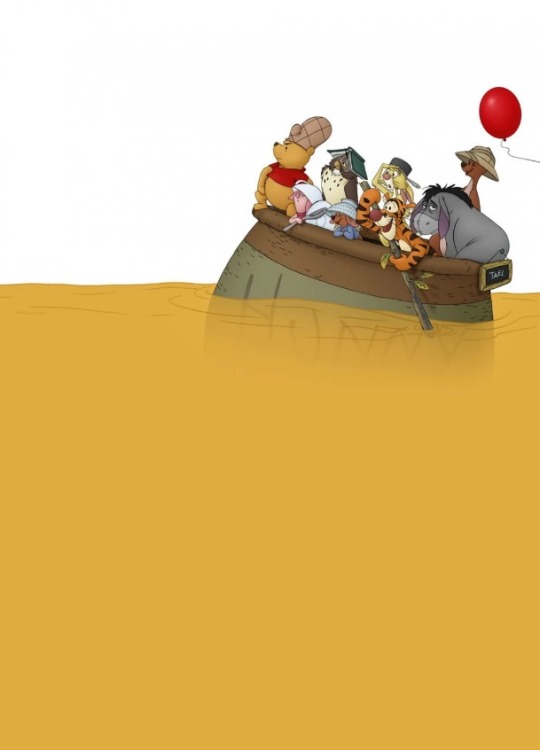
Absolutely LOOOOOOOOOOVE this poster for Winnie the Pooh!
~0~💛🍯🐝~0~
#disneynerdpumpkin#disney#winnie the pooh#piglet#pooh bear#rabbit#kanga#roo#owl#eeyore#tigger#i need to know the backstory behind this#like how did they end up in a literal SEA of honey?!?!#b'loon#I love this sm#this is chaos lol#absolutely love how determined pooh looks with the oven mitt on his head lol#absolutely ridiculous but i love it lol#this reminds me of George Washington crossing the Delaware#winnie the pooh 2011#yo I'm a genius I just came up with something to call this#crossing the Bell-Ah-Dare#idk lol I just felt like that was the “Winnie the Pooh” equivalent of crossing the Delaware
17 notes
·
View notes
Text

Washington Crossing The Delaware (1851) by Emanuel Leutze
During the American Revolutionary War, General George Washington and the Continental Army crossed the Delaware River on the evening of December 25, 1776, to stage a surprise attack against Hessian forces (German mercenaries hired by the British) garrisoned at Trenton, New Jersey. After crossing the Delaware River, Washington and his troops successfully attacked the Hessian forces in the Battle of Trenton on the morning of December 26, 1776. The military campaign was organized in great secrecy by Washington, who led a column of Continental Army troops from today's Bucks County, Pennsylvania across the icy Delaware River to today's Mercer County, New Jersey in what was one of the Revolutionary War's most logistically challenging and dangerous clandestine operations.
🦅🇺🇸🦅
#american history#american revolution#george washington#crossing the delaware#continental army#1776#battle of trenton#delaware river#trenton#new jersey#18th century#american independence
10 notes
·
View notes
Text
If your own windows are glass, Chapter 15.
“They’re printing their names on it?” Sarah sounded shocked. “Have they gone mad?”
#iyowag#liberty's kids#james hiller#sarah phillips#my writing#lol remember when i was cranking out like a chapter a week#it's busy season at work i can't help it#somehow washington crossing the delaware is the least significant thing that happens in this chapter#also there's shameless printing press flirting
7 notes
·
View notes
Text
George Washington crossed the Delaware River in 1776 in the middle of winter under the cover of darkness to free his country from England.
I crossed the Delaware River twice in one day because my wife wanted Krispy Kreme donuts and the closest location was in the next state over.
I like to think George Washington would be proud of such progress in his beloved nation.
#first world struggles#first world privileges#krispy kreme#George Washington#why did it have to be in new jersey#delaware river crossing#donuts
7 notes
·
View notes
Photo
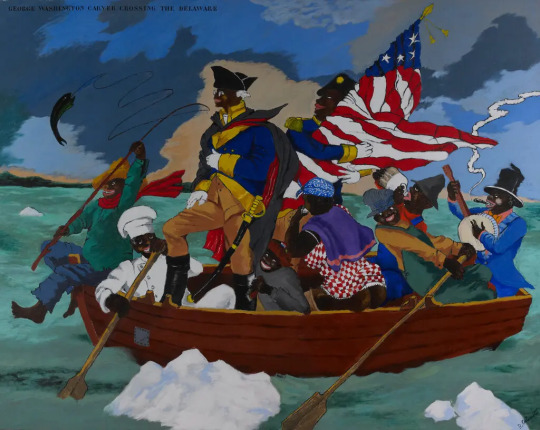
Robert Colescott’s “George Washington Carver Crossing the Delaware: Page From an American History Textbook,” 1975, at the New Museum.
Credit...The Robert H. Colescott Separate Property Trust/Artists Rights Society (ARS), New York; via Lucas Museum of Narrative Art, Los Angeles
10 notes
·
View notes
Text
Happy "George Washington Kicked A Bunch of German Ass" Day everyone!
10 notes
·
View notes